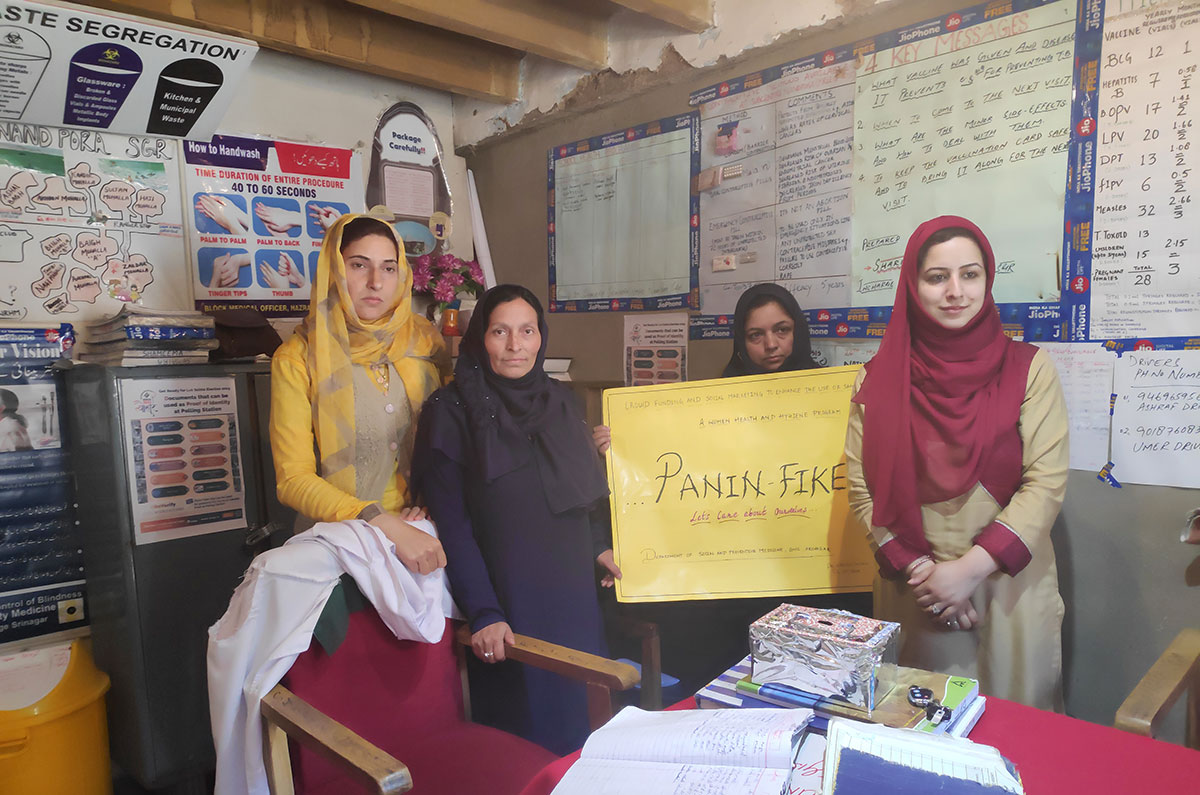A young lady doctor found a peculiar crisis among the city girls; they lacked access to better personal management during the specific days of their lives. She investigated the causes and came with a solution that she is keen to take to the next level, reports Umar Mukhtar

Usually, when doctors detect wrong traditions in the medical care systems having an adverse impact on peoples’ health, they counsel them. But there are a few game-changers who go beyond that. A postgraduate student of government medical college Srinagar (GMC), Dr Auqfeen Nisar is one such healer who did not stick to the yard of counselling. She took an initiative to eradicate the ill practice. Auqfeen provides sanitary pads to the underprivileged girls who use cloths to manage their menstrual hygiene.
Currently pursuing her MD in community medicine, Auqfeen has to attend a weekly Out Patient Department (OPD) session in the interiors of the Srinagar city. Every Wednesday, she religiously drives to a sub-centre in Ranger Stop locality. Over the years, what she observed was both shocking and a wake-up call for Auqfeen.
Auqfeen observed that adolescent girls were using used cloths during their periods because they were fed with the notion that sanitary pads lead to infertility. “For the last one year, I am there; many women, mostly the young adolescent girls with different ailments, come to me; most of the cases I see had the menstrual hygiene problems,” the young doctor said. Reproductive tract infection was the dominant disease that the girls were infected with by using worn out, used clothes.
This is something that had not come to her imagination ever. “In the twenty-first century, how can young girls from the city of Kashmir expose themselves to such questionable and problematic menstrual hygiene?” she asked.
Auqfeen tried to find out the probables behind the barriers. The first serious follow-up she opted for was that she carried out a survey, sort of field research. “I went door-to-door and conducted the interviews where I asked them the reasons for not using the sanitary pads,” the doctor said. She found two main reasons for why adolescent girls stay away from the sanitary pads during their periods: lack of awareness and economic conditions.
“These girls were influenced by their mothers; I found that the latter counsel them not to use the sanitary pads as these lead to infertility,” Auqfeen said. “Apart from the wrong and misleading counselling, social taboo plays a very important part. If they had some issues, they never share it with others, even sometimes not even with doctors.”
When she got to know the cause, it was her conscience that led her to think, what next. So pained by the poor hygiene, Auqfeen started a crowd-funding campaign. She shared a post on the social media where she asked for people to contribute. She named this project as PanenFiker, which loosely translates into ‘to take care of ourselves’.
“I picked this name for the project because it was appealing. Also, women care for all, be it the family or others; so, by this name, I appeal them to take some time for yourself too,” she added.
Auqfeen started this project on an individual level but this got a positive response from all the quarters. Quickly, the people started getting associated with the initiative. “It is a project in social marketing to enhance the use of sanitary pads among the adolescent girls,” she added.
After careful analysis, Auqfeen decided to provide the sanitary pads on subsidized rates so that girls can start using it. But social acceptance was still a major challenge. Would the girls accept the sanitary pads and start using it or not, was something Auqfeen was unsure about.
With her fingers crossed, she started the project and the response was positive. Almost all the girls gave a satisfactory response to the use of the sanitary pads.
“I could have provided these sanitary pads free of cost but I preferred giving them on subsidized rates,” Auqfeen said. “I decided to counsel them that these pads would be provided to them on cheaper rates.” It clicked.
As the word spread, the project is getting popular as more and more support is coming to the NGO. “Most of the donations I get from my own department,” Auqfeen said. “Some do support from the larger society as well.”
But the real tension that Auqfeen has is that she is yet to manage answers for is if this is the state of the girls living in the city, what will be the state of awareness about personal hygiene of girls living in Kashmir periphery.
So in order to spread the word of awareness about hygiene, Auqfeen wants to go to the far-off places in rural areas. “I will start a website where I can ask people to contribute to the cause so that I can assist them, the same way I am doing it here for the city girls.”















